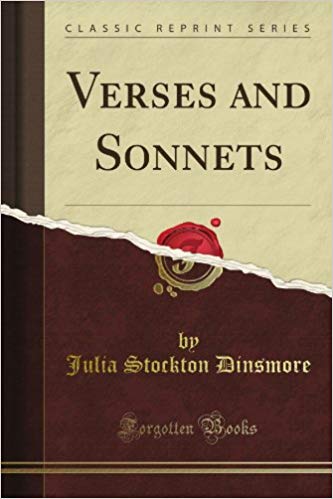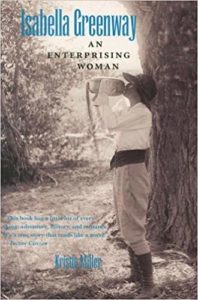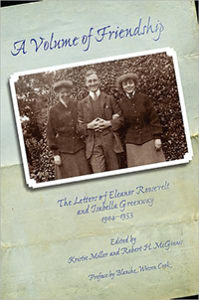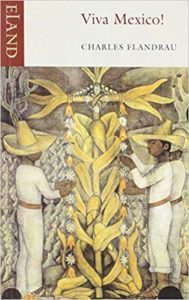Additional Resources
Websites
Boone County Historical Society
Books
The following are resources written by or about the people who make up the Dinsmore story. Click on the images to purchase on Amazon.
Verses and Sonnets by Julia Dinsmore
 When Julia S. Dinsmore was in her late forties, she began writing poetry for her own enjoyment and for her nieces. She sent many of these poems to newspapers and magazines, signing her name FV, which we believe stands for something like "feminine verse" or versifier. The New Orleans Times-Democrat was one of the few papers to print her poems because there were numerous women poets competing with her. In 1910, Sally F. Cutcheon, Julia's niece, helped her to publish many of her poems and sonnets, which were then sent to relatives and close friends, including Theodore Roosevelt.
When Julia S. Dinsmore was in her late forties, she began writing poetry for her own enjoyment and for her nieces. She sent many of these poems to newspapers and magazines, signing her name FV, which we believe stands for something like "feminine verse" or versifier. The New Orleans Times-Democrat was one of the few papers to print her poems because there were numerous women poets competing with her. In 1910, Sally F. Cutcheon, Julia's niece, helped her to publish many of her poems and sonnets, which were then sent to relatives and close friends, including Theodore Roosevelt.
Isabella Greenway: An Enterprising Woman by Kristie Miller
 Miller's meticulous biography captures a life of adventure and romance, from southern tobacco country to the ballrooms of New York, from western ranches to the dome of the US Capitol. She shows national politics played out behind the scenes, Isabella's lifelong friendship with Eleanor Roosevelt, and the drama of a loyal wife caring for a dying husband despite having fallen in love with a younger man. The book also shows Greenway's considerable influence on the development of Arizona's business and politics in the early decades of statehood. Although Isabella Greenway died in 1953, the Arizona Inn—a tribute to her enterprise—remains a premier resort hotel, celebrating its 75th anniversary in 2005. This book, too, celebrates Isabella's energy, vision, indomitable spirit, and love of life.
Miller's meticulous biography captures a life of adventure and romance, from southern tobacco country to the ballrooms of New York, from western ranches to the dome of the US Capitol. She shows national politics played out behind the scenes, Isabella's lifelong friendship with Eleanor Roosevelt, and the drama of a loyal wife caring for a dying husband despite having fallen in love with a younger man. The book also shows Greenway's considerable influence on the development of Arizona's business and politics in the early decades of statehood. Although Isabella Greenway died in 1953, the Arizona Inn—a tribute to her enterprise—remains a premier resort hotel, celebrating its 75th anniversary in 2005. This book, too, celebrates Isabella's energy, vision, indomitable spirit, and love of life.
A Volume of Friendships: The Letters of Eleanor Roosevelt and Isabella Greenway 1904-1953 Edited by Kristie Miller and Robert H. McGinnis
In these intimate letters, Eleanor Roosevelt and Isabella Greenway chronicle a fifty-year friendship dating back to their school days at the beginning of the twentieth century. They share family concerns, discuss national and world affairs, support each other in times of personal tragedy, and chart their respective political careers--Roosevelt as a social reformer and first lady and Greenway as Arizona's first congresswoman. Kristie Miller's and Robert McGinnis's astute analysis and insightful commentary enable scholars and general readers to view this remarkable correspondence against the backdrop of state and national politics, the Depression and New Deal, and the changing roles of women in American society.
Pioneer to the Past: The Story of James H. Breasted by Charles Breasted
Pioneer to the Past tells the intensely human, often poignantly moving story of the brilliant career of James Henry Breasted, one of the greatest Egyptologists and archaeologists America has yet produced. Breasted's greatest achievement was the founding of the Oriental Institute at the University of Chicago in 1919, through the generous support of John D. Rockefeller, Jr. The Oriental Institute embodies Breasted's vision of an inter-disciplinary research center that unites archaeology, textual studies, and art history as three complementary methodologies to provide a holistic understanding of ancient Near Eastern civilizations, and the ways that they laid the foundations for what we think of today as "Western civilization." Breasted's legacy continues to flourish today. Reprint of the Scribner's Sons 1943 Edition, with New Foreword and Photographs.
Viva Mexico! A traveller's account of life in Mexico by Charles Flandrau
Charles M. Flandrau was a young rich American with an individual sense of humor, and no prejudices except against Western uniformity. His travel book is more than a ramble among places; it is a journey among the Mexican people. His brother established a coffee plantation in Mexico in 1903, and Charles travelled there with his mother in 1904. The experiences gained from this visit, along with two other visits in subsequent winters, formed the basis for Viva Mexico! which he described as "one long, carelessly written but absorbing romance." "A portrait that is both humorous and profound"~ Times Literary Supplement



